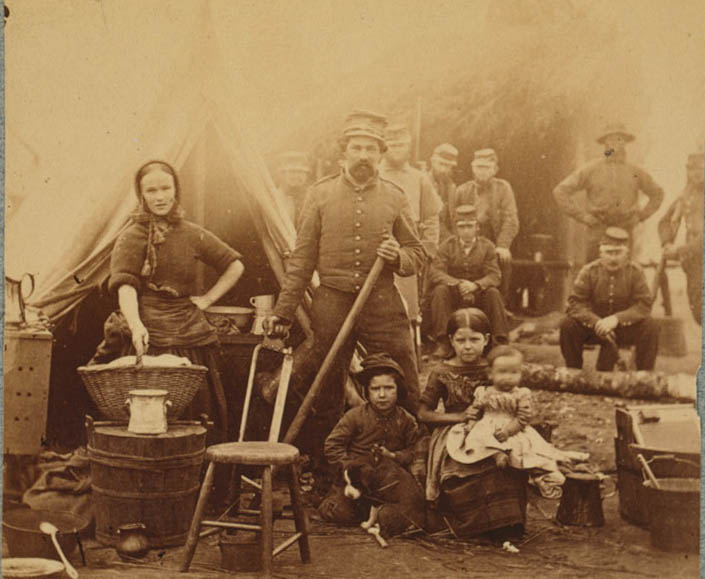Before modern military logistics, armies often relied on camp followers. Camp followers were unenlisted people, usually soldiers’ families or relatives, who willingly traveled with an army as it moved through its campaign. This wasn’t always an officially approved practice, but it alleviated some of the strain on the more primitive logistical services available to armies at the time.
These campaigns were usually the most dangerous times for an army, as they would be engaging in combat. However, camp followers were still needed. They massively helped an army’s organization but they also often came under fire for using up valuable resources meant for the troops.
Camp followers
During the Revolutionary War, thousands of American women offered their services to the military and helped with laundry, cooking, nursing, and general logistics. A large number of these women were widows or had been displaced by the ongoing war.
In addition to widows and the displaced, the wives of high-ranking officials would sometimes follow the campaign.
Camp followers were critical for maintaining an army’s morale and its continued smooth operation. In general, they came in two main types; the previously mentioned wives and families, and civilian traders. These traders joined the followers and sold soldiers goods and services that the government didn’t supply themselves.
The followers were critical in performing the lesser thought of tasks when it comes to keeping an army in tip-top shape.
Some women were washerwomen for high-ranking officials and helped maintain their hygiene, which was expected to be at the very best at all times. Their roles spread to the army as a whole; washing the troops’ clothes, tidying the campsite, cleaning utensils, and keeping a continuous supply of running water.
By completing these jobs the followers kept troops fighting fit and significantly reduced diseases and infections from spreading around the army. Interestingly, one of the benefits of camp followers was a reduction in the desertion rate among troops. As they had their families with them, troops were less likely to go home.
Usually, these services were provided free of charge, but some armies opted to pay the followers for their work.
Some were well-paid
On numerous occasions, men and women who followed an army and provided logistical help were given a fair wage.
General George Washington had his fair share of experience with camp followers during the Revolutionary War, of which huge numbers of his men became sick. Washington brought in more followers to tend to these men and eventually, Congress authorized payment for nurses following the continental army. This pay was 8 dollars a month.
A logistical burden
Camp followers reduced logistical strains in some ways and increased it in others, sometimes to worrying levels. With the extra mouths needing food, commanders required even more food, clothes, and general supplies to keep both their troops and their followers healthy. The number of followers could often rival the army itself, so sometimes it wasn’t possible to feed them all. In such cases, the frailest or vulnerable were simply sent home.
An army needed even more security to ensure the followers were safe too, while extra policing was necessary to keep them in line.
Modern followers
With modern advances in technology, the logistical organization of an army has been made much easier. Aircraft and helicopters can precisely deliver supplies ordered hours ago or rapidly evacuate the wounded. Because of this, the presence of camp followers has slowly dwindled. Although in some primitive armies followers were used even into the 20th century.
Today, traditional camp followers are virtually non-existent, but civilians offering their services to the most modern militaries can be considered their evolutionary counterparts. For example, in both the Iraq and Afghanistan wars civilian contractors were heavily involved in military activities. fast food chains such as Burger King, Pizza Hut and KFC have even opened up premises on military installations.
Shops filled with products from back home like energy drinks, fruit, candy, and even video games were frequented by soldiers serving in the region.
So while the camp followers of the past may be redundant in today’s world, the need for non-regulation goods still exists and is supplied by civilians.
